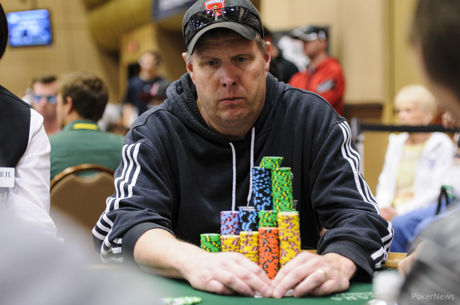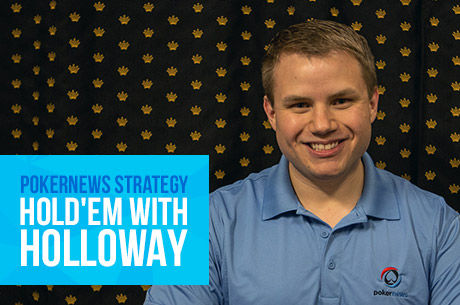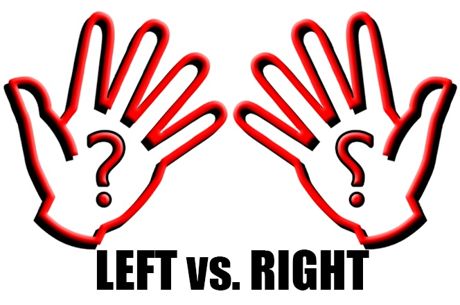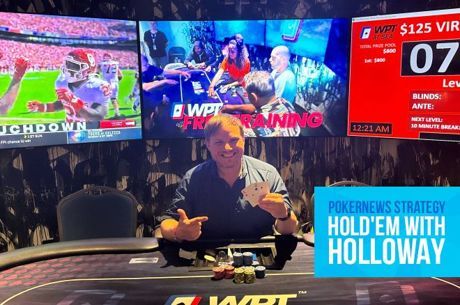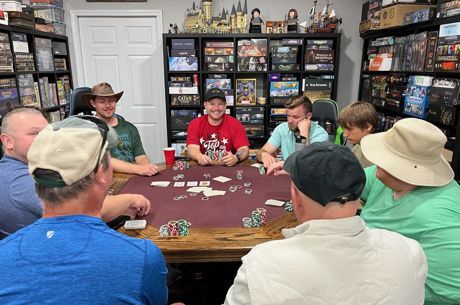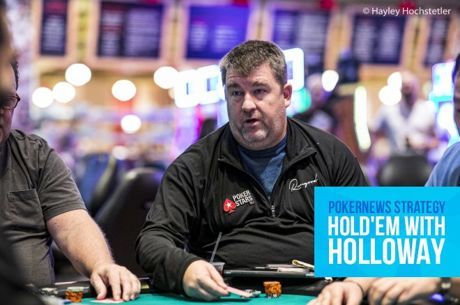Hold’em with Holloway, Vol. 72: Answering User-Submitted Poker Scenarios
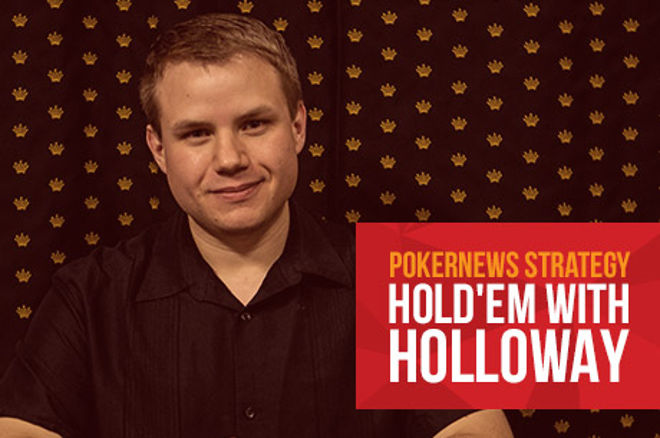
As many of you may know, my tenure with PokerNews is coming to an end after six long years. On April 8, I will finish my run with a final edition of The Online Railbird Report, which means I’ve just two Hold’em with Holloways remaining. This is the penultimate edition, and I’ll return next week to wrap things up.
That said, let’s not allow the end of an era damper our weekly lesson. For this week’s edition, I’ve decided to share some scenarios presented to my by “John,” who recently attended my webinar with Jonathan Little. He reached out to get my take on various situations, and with his permission I’ve decided to share them with you.
Scenario 1
John: It’s a $150 tourney in Shreveport, Louisiana. 25-minute levels. Usually 4-5 hour tournament. Blinds 300/600, 75 ante. I have a 5.5-6k stack, and it’s five-handed (two tables left). I’m on the button with Ax8x offsuit, less than 10 big blinds, and shove. The big blind snap-calls with AxKx. I think it’s a standard shove but I felt that my opponent was going to call me even before I made the shove. I had a “bad feeling” about shoving, but then again I’m always a little paranoid when being short-stacked.
However, given the blinds/antes so high and five-handed play I think I had to go with it, right? The math dictates the shove right regardless of my “read” on the player (she seemed to grin a little bit after seeing her cards), but also keep in mind that I have never played with her before and she seemed to be a happy person in general so I don’t know how reliable my read was.
My Take: Assuming that action folded to you on the button, then yes, I would absolutely shove with Ax8x. According to SnapShove, the app developed by Max Silver to determine shove ranges (I highly recommend investing the $9.99 to have it on your phone), you should mathematically be shoving with any ace (even Ax2x-offsuit), any king, Qx5x+, as well as suited 6x5x+. Basically a huge range, so Ax8x in that spot is great.
As for the lady, what can you do? Sometimes they just wake up with big hands. Unless you had a tested and reliable tell on her, then I’d go with Ax8x every time. She could have just as easily had KxQx and called, in which case you would have been ahead.
You definitely did right by shoving, just bad luck to run into a bigger ace.
Scenario 2
John: It’s a $225 tourney, also in Shreveport, Louisiana. 25-minute levels. Usually 4-5 hour tournament. Final table tourney scenario: four-handed play, I’m a top three stack with 160,000, other two big stacks have about 180,000-200,000, while a short stack has five big blinds with the blinds at 5,000/10,000/2,000.
I’m on the button with pocket queens and I raise to 23,000, the big blind calls, and the flop is 10♦6♦6♠. The big blind checks and I continuation bet 25,000. He shoves all in and seemed “strong,” but can you really fold queens here? Assume that this is a player who respects my image and maybe got in a hand with me once the entire tourney. I am 90% certain that he would not call a raise with a random six in his hand given his image.
When he went all in, I again had a “bad feeling” but at the same time was excited because I had pocket queens and there was no way that he would be able to put me on that. It turns out he had pocket kings. I think my play was fine at the time, but sometimes I get these vibes and after seeing the hands, I feel that my “vibes” were right and if I listened to it I would still have 10 bigs and could grind out the small stack.
My Take: I am never folding queens in that spot. To me, the likelihood that he’s doing it with either a 10x or as a complete bluff — perhaps trying to leverage that he doesn’t think you’ll call and want to bust with a short stack still in play — is just too high.
Like you said, it’s too hard to put him on a six in this spot, plus if he really had one why would he want to blow you off the hand by moving all in? Why not just raise smaller or even call and give you rope with which to hang yourself on the turn?
Likewise, given he just called out of position it’s difficult to put him on a big hand — such as the pocket kings he had. Kudos to him for playing it that way, but you shouldn’t feel bad. In this instance folding pocket queens in this spot would have saved you, but doing that in the long run would be the wrong move.
I go bust in that spot every time — it’s just a cooler.
Scenario 3
John: Over the last two months, I feel that I have improved significantly in poker. I started watching some of Jonathan Little’s webinars and started playing online, so I feel that I have learned to be more aggressive and am playing position better. I would say that I do fairly well at $1/$2 and $2/$5 cash games, but I want to start playing $5/$10 more often. I’ve played the $5/$10 once or twice and realized that I was too passive and not aggressive enough.
I feel that I’ve become more “loose” and play more hands in position trying to use my “tight” image to take pots that aren’t mine. However, no one knows that I am bluffing given that I have a tight image and that I don’t play many hands and usually show up with overpairs and sets.
I try to three-bet preflop more often. I rarely three-bet and usually people just fold. I would like to take advantage of this play more, but it seems as though every time I three-bet bluff I run into big hands. How do I handle this? Do I still continue to do this and just realize that I will eventually be profitable?
My Take: First, when it comes to playing $1/$2, $2/$5, and looking to move up to $5/$10, I highly recommend Ed Miller’s book The Course. It’s basically focuses on those stakes and what it takes to move up to each level (and what you can expect to find). It did wonders for my cash game.
When you three-bet bluff you must remember that there is a chance an opponent will wake up with a big hand (especially since you don’t have one). I’d continue to do it, but just proceed with caution (or give up and move on) when you’re met with resistance, whether it’s someone four-betting or calling you down.
It seems you have a good grasp on table dynamics, how you’re perceived, and you try to take advantage of that accordingly, which is exactly what you should be doing.
Also, someone recently told me, “Try to win the pots nobody wants,” which I thought was wise advice. Be it cash games or tournaments, there are those smaller and uneventful pots where it seems the first person to bet will take it down. I try to be that person as those sort of pots add up quickly.
Want to stay atop all the latest in the poker world? If so, make sure to get PokerNews updates on your social media outlets. Follow us on Twitter and find us on both Facebook and Google+!
In this Series
- 1 Hold’em with Holloway, Vol. 1: Making Reads and Trusting Them
- 2 Hold’em with Holloway, Vol. 2: Playing in Poker Charity Events
- 3 Hold’em with Holloway, Vol. 3: Throttle Back Before You End Up Punting
- 4 Hold’em with Holloway, Vol. 4: Punish the Satellite Bubble
- 5 Hold’em with Holloway, Vol. 5: What is Proper Accumulator Strategy?
- 6 Hold’em with Holloway, Vol. 6: A Chip and a Chair Story with “SirWatts”
- 7 Hold’em with Holloway, Vol. 7: 15 Things About Poker I Wish I’d Known Sooner
- 8 Hold’em with Holloway, Vol. 8: Examining the Largest Overlay in Poker History
- 9 Hold’em with Holloway, Vol. 9: Differences Between Rebuys and Reentries
- 10 Hold’em with Holloway, Vol. 10: Five Must-Read Poker Books of 2014
- 11 Hold’em with Holloway, Vol. 11: When Will You Finally Break Through?
- 12 Hold’em with Holloway, Vol. 12: Dealing with a Target on Your Back
- 13 Hold’em with Holloway, Vol. 13: Knowing When to Call It Quits
- 14 Hold’em with Holloway, Vol. 14: Embarking on a Year-Long Weight Loss Journey
- 15 Hold’em with Holloway, Vol. 15: Navigating Multiple Decision Points in a Poker Hand
- 16 Hold’em with Holloway, Vol. 16: Chris Moorman Tells Me How Badly I Play Poker
- 17 Hold’em with Holloway, Vol. 17: Richard “nutsinho” Lyndaker on Getting It in Marginal
- 18 Hold’em with Holloway, Vol. 18: Getting Inside the Head of Poker Pro Brian Rast
- 19 Hold’em with Holloway, Vol. 19: Stupid Calls & Lucky Draws in MSPT WI Championship
- 20 Hold’em with Holloway, Vol. 20: Talking Ante-Only Strategy with Greg “FossilMan” Raymer
- 21 Hold’em with Holloway, Vol. 21: Contributing to Jonathan Little’s New Book
- 22 Hold’em with Holloway, Vol. 22: Consequences of Acting Out of Turn & Tossing in Chips
- 23 Hold’em with Holloway, Vol. 23: When It Comes to Chops, Do What’s In Your Best Interest
- 24 Hold’em with Holloway, Vol. 24: Accepting Bad Beats & Lessons in Selling Action
- 25 Hold’em with Holloway, Vol. 25: Heinz’ Ace-High Call Shows Why He's a World Champ
- 26 Hold’em with Holloway, Vol. 26: Is Keeping the Short Stack Alive Collusion?
- 27 Hold’em with Holloway, Vol. 27: Great Laydown or Bad Fold on Poker Night in America?
- 28 Hold’em with Holloway, Vol. 28: Calling Hellmuth with Jack-Deuce Offsuit
- 29 Hold’em with Holloway, Vol. 29: The Philosophy of "No-Chop" Chad
- 30 Hold’em with Holloway, Vol. 30: Preparing to Play the World Series of Poker
- 31 Hold’em with Holloway, Vol. 31: Staying on Your Grind at the World Series of Poker
- 32 Hold’em with Holloway, Vol. 32: The Perilous Decision to Call Off with Ace-Queen
- 33 Hold’em with Holloway, Vol. 33: Using Poker Skills in Reality TV Competitions
- 34 Hold’em with Holloway, Vol. 34: Esfandiari Explains How to Recover from Bad Beats
- 35 Hold’em with Holloway, Vol. 35: Tilly vs. Brunson in Super High Roller Cash Game Hand
- 36 Hold’em with Holloway, Vol 36: Unconventional Play Leads to Good WSOP Main Event Start
- 37 Hold’em with Holloway, Vol. 37: Lessons in Pot-Limit Omaha Hi-Low w/ Evan Jarvis
- 38 Hold’em with Holloway, Vol. 38: Things to Say and Do When You Bust a Poker Tournament
- 39 Hold’em with Holloway, Vol. 39: How Much Did I Have to Raise to Get You to Fold?
- 40 Hold’em with Holloway, Vol. 40: Practicing Patience in My Deep PPC Poker Tour Run
- 41 Hold’em with Holloway, Vol. 41: Analyzing a Questionable SHRPO Main Event Hand
- 42 Hold’em with Holloway, Vol. 42: Analyzing the Play of Neymar Jr. at EPT Barcelona
- 43 Hold’em with Holloway, Vol. 43: The Value of a Reliable Poker Reputation
- 44 Hold’em with Holloway, Vol. 44: John “KasinoKrime” Beauprez Rips My PLO Game Apart
- 45 Hold’em with Holloway, Vol. 45: Satellite Dilemmas -- To Call or Not to Call
- 46 Hold’em with Holloway, Vol. 46: Seiver Leverages the River in Super High Roller Bowl
- 47 Hold’em with Holloway, Vol. 47: What Untraditional Moves in Poker Might Mean
- 48 Hold’em with Holloway, Vol. 48: Thinking About the Future with Sam Grizzle
- 49 Hold’em with Holloway, Vol. 49: WCOOP Champ “Coenaldinho7” Offers Up His Biggest Hands
- 50 Hold’em with Holloway, Vol. 50: The Peril of Shoving Weak Aces
- 51 Hold’em with Holloway, Vol. 51: The Importance of Not Giving Up in Poker Tournaments
- 52 Hold’em with Holloway, Vol. 52: Does Asking “Check” Actually Constitute a Check?
- 53 Hold’em with Holloway, Vol. 53: Thomas Cannuli Impresses Even After Main Event Bustout
- 54 Hold’em with Holloway, Vol. 54: Dealers Aren’t Always Right
- 55 Hold’em with Holloway, Vol. 55: Don’t Get Married to Pocket Aces
- 56 Hold’em with Holloway, Vol. 56: Bazeley’s Survival Instinct Leads to Continued Success
- 57 Hold’em with Holloway, Vol. 57: Playing “Deuces Wild” on the European Poker Tour
- 58 Hold’em with Holloway, Vol. 58: The Wildest Hand in European Poker Tour History
- 59 Hold’em with Holloway, Vol. 59: Death, Zombies & Spending Time w/Phil Hellmuth
- 60 Hold’em with Holloway, Vol. 60: How the Unstoppable Fedor Holz Managed to Win Again
- 61 Hold’em with Holloway, Vol. 61: Lessons To Be Learned When You Hit the Big Stage
- 62 Hold’em with Holloway, Vol. 62: Steve O’Dwyer Explains the “Oreo Cookie Tell”
- 63 Hold’em with Holloway, Vol. 63: What Would Happen to a Chip Stack If a November Niner Died?
- 64 Hold’em with Holloway, Vol. 64: Forgetting One Chip -- Should It Still Be an All-In Bet?
- 65 Hold’em with Holloway, Vol. 65: Todd “sharkslayerrr” Breyfogle on Bankroll Management
- 66 Hold’em with Holloway, Vol. 66: Cash Game Pro Daniel Arfin Offers Sound Bankroll Advice
- 67 Hold’em with Holloway, Vol. 67: Honeyman Plays Kings to Keep in Opponent’s Bluff Range
- 68 Hold’em with Holloway, Vol. 68: Why Do I Even Bother Drinking at the Poker Table?
- 69 Hold’em with Holloway, Vol. 69: Is Your Favorite Poker Pro Left- or Right-Handed?
- 70 Hold’em with Holloway, Vol. 70: In Order to Live You Have to Be Willing to Die
- 71 Hold’em with Holloway, Vol. 71: How to Amass a Big Stack Early in a Poker Tournament
- 72 Hold’em with Holloway, Vol. 72: Answering User-Submitted Poker Scenarios
- 73 Hold’em with Holloway, Vol. 73: Saying Goodbye with a Top Five List
- 74 Hold'em with Holloway, Vol. 74: We're Back, Baby!
- 75 Hold'em with Holloway, Vol. 75: Jivkov on Exploiting Capped Ranges
- 76 Hold’em with Holloway, Vol. 76: Matt Bretzfield Gets Tricky With Aces
- 77 Hold'em with Holloway, Vol. 77: Joseph Cheong Gets Crazy with a Pair of Ladies
- 78 Hold'em with Holloway, Vol. 78: Wyoming Poker Action & Wild South Dakota Hand
- 79 Hold'em with Holloway, Vol. 79: Calling Controversy at WinStar
- 80 Hold'em with Holloway, Vol. 80: Going for Value with Matt Hunt
- 81 Hold'em with Holloway, Vol. 81: Bracelet Winner Ryan Leng on Bad Call
- 82 Hold'em with Holloway, Vol. 82: Romeopro33 Recounts XL Eclipse Victory
- 83 Hold'em with Holloway, Vol. 83: Men The Master Doesn't Get Paid
- 84 Hold'em with Holloway, Vol. 84: Harman Hits Back-to-Back Miracle Turns
- 85 Hold'em with Holloway, Vol. 85: Jamie Kerstetter on Dealing with Bounties
- 86 Hold'em with Holloway, Vol. 86: Matt Stout Develops a Limp Dynamic
- 87 Hold'em with Holloway, Vol. 87: Matt Alexander Caught in Between w/ Two Red Aces
- 88 Hold'em with Holloway, Vol. 88: John Beauprez on Why He Folded a Set of Jacks
- 89 Hold'em with Holloway, Vol. 89: Alex Aqel Lets Opponent Hang Himself with Aces
- 90 Hold'em with Holloway, Vol. 90: David Peters Makes Beastly Call Against Will Givens
- 91 Hold'em with Holloway, Vol. 91: Poker Lessons from a Game of Risk
- 92 Hold'em with Holloway, Vol. 92: My Upstuck Diagnosis by the CLC Squad
- 93 Hold'em with Holloway, Vol. 93: Alex Foxen Coolers Nick Petrangelo in SHRB
- 94 Hold'em with Holloway, Vol. 94: My $25,000 PSPC Experience at 2019 PCA
- 95 Hold'em with Holloway, Vol. 95: The Equity of Leveraging Time Extensions
- 96 Hold'em with Holloway, Vol. 96: Dan O'Brien on Developing Healthy Routines
- 97 Hold'em with Holloway, Vol. 97: Big Hands From the WSOP-C Potawatomi
- 98 Hold'em with Holloway, Vol. 98: Simon Deadman Rips Apart My NLH Tourney Play
- 99 Hold'em with Holloway, Vol. 99: Shoving 10-6 Smack Dab Into Pocket Aces
- 100 Hold'em with Holloway, Vol. 100: The Revived Re-Entries Debate

